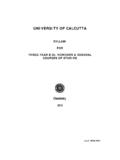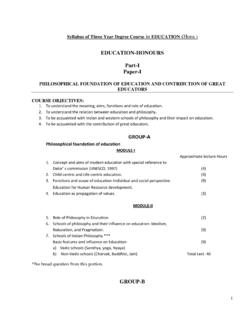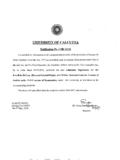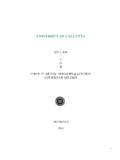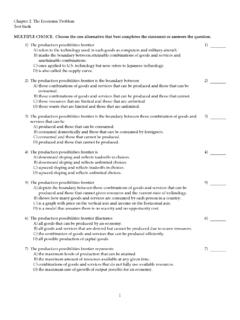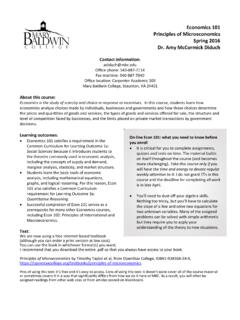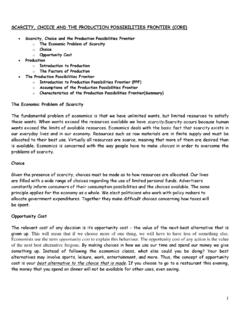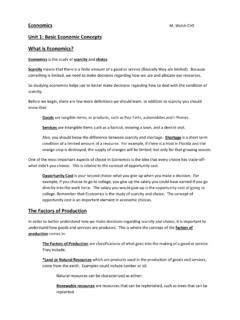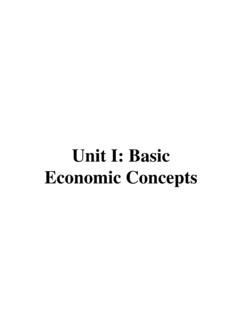Transcription of UNIVERSITY OF CALCUTTA
1 Yuiopasdfghjklzxcvbnmqw fghjklzxcvbnmqwertyuio xcvbnmqwertyuiopasdfghjk mqwertyuiopasdfghjklzxcvb yuiopasdfghjklzxcvbnmqw qwertyuiopasdfghjklzxcvbnmqwertyf ghjklzxcvbnmqwertyuiopasdfghjklzx cvbnmqwerty uiopasdfghjklzxcvbnmq wert opasd hjklz vbn UNIVERSITY OF CALCUTTA c. ECONOMICS (HONOURS AND GENERAL) SYLLABUS UNDER choice BASED CREDIT SYSTEM ertyui pasdfg lzxc nmq To be effective from the academic session 2018-19 wert ertyui opasdfg hjklzxcvbnmqwertyuiopasdfg hjklzxcvbnmqwertyuiopasdfghjklzxc vbnmqwertyuiopasdfg hjklzxcvbnmq wertyuiopasdfghjklzxcvbnmqwertyui opasdfg hjklzxcvbnmqwertyuiopasdfg hjklzxcvbnmrtyuiopasdfghjklzxcvbn mqwertyuiopasdfghjklzxcvbnmqwert yuiopasdfghjklzxcvbnmqwertyuiopas dfghjklzxcvbnmqwertyuiopasdfghjklz Page 2 of 75 BA/BSc ECONOMICS (HONOURS) SYLLABUS, UNIVERSITY OF CALCUTTA , UNDER choice BASED CREDIT SYSTEM To be effective from the academic session 2018-19 Table 1.
2 Marks and Paper distributions with credit Credits Course Type Total Papers Credit Marks Core Courses (CC) 14 14*6=84 14*100=1400 Discipline Specific Electives (DSE) 4 4*6 =24 4*100 = 400 Generic Electives (GE) [C overing Two Disciplines with two courses each. Any discipline in any semester] 4 4*6=24 4*100= 400 Ability Enhancement Compulsory Courses- AECC [C onsisting of two Ability Enhancement Compulsory Courses AECC-1 and AECC-2] 2 [ AECC-1 is Communicating English/ Modern Indian Languages(MIL) and AECC-2 is Environmental Studies (ENVS)] 2*2=4 100*2= 200 Skill Enhancement Courses (SEC) 2 2*2=4 100*2=200 Totals 26 140 2600 Continuous Internal Assessment and Students Attendance: For each paper 10% will be reserved for continuous internal assessment (CIA) and 10% will be reserved for attendance of the students.
3 CIA may take the form of written examination/s, take- home assignments, viva-voce; presentation etc depending on the course instructor. As per definition CIA will be assessed fully internally by the course instructor. Types of tutorials: Tutorial classes are introduced per course (except for AEC and SEC) to give the students an idea of detailed understanding of the course and also to build their confidence on the subject in terms of (i) solving problems, (ii) presenting a paper in terms of board work or power point,(iii) preparation of term paper etc. A tutorial class also helps a teacher to clarify any topic in detail to the students.
4 A tutorial contact hour has been meant to promote teacher-student academic interaction. The norm of examination for this part of the course will be decided later. Unlike all other Science subjects Economics should not be treated as a laboratory based subject. After all it is a subject under Social Science and so there is limited scope for introducing pra ctical part for each course. Only under Discipline Specific Elective-A, Page 3 of 75 5th Semeste r/6th Semester, for the Courses Applied Econometrics and Issues in Indian Economy (under DSE A) there will be a practic al part of 30 marks (2 credits ) instead of tutorial part of 15 marks (1 credit).
5 Practical classes in case of Applied Econometrics will be conducted on the basis of laboratory -based specified softwares (STATA or R). Practic al classes for the course Issues in Indian economy Method followed for coding the Courses Economics Honours Core Course 1, 1st semester (Theory): ECO-A-CC-1-1-TH Economics Honours Core Course 1, 1st semester (Tutorial): ECO-A-CC-1-1TU Page 4 of 75 Table 2 :Course structure semester-wise: Economics (Honours) Table 2A :Semester I (July to December) Type of Course Name of the Course Credit Marks Economics Core Course I (ECO-A-CC-1-1-TH-TU) Introductory Microeconomics[Theory plus Tutorial] 5+1=6 100 Economics Core Course II (ECO-A-CC-1-2-TH-TU) Mathematical Methods for Economics-I [T heory plus Tutorial] 5+1=6 100 Table 2B.
6 Semester II (January to June) Type of Course Name of the Course Credit Marks Economics Core Course III (ECO-A-CC-2-3-TH-TU) Introductory Macroeconomics [Theory plus Tutorial] 5+1=6 100 Economics Core Course IV ( ) Mathematical Methods for Economics-II [T heory plus Tutorial] 5+1=6 100 Table 2C :Semester III (July to December) Type of Course Name of the Course Credit Marks Economics Core Course V (ECO-A-CC-3-5-TH-TU) Intermediate Microeconomics-I [Theory plus Tutorial] 5+1=6 100 Economics Core Course VI (ECO-A-CC-3-6-TH-TU) Intermediate Macroeconomics-I [Theory plus Tutorial] 5+1=6 100 Economics Core Course VII (ECO-A-CC-3-7-TH-TU) Statistics for Economics [Theory plus Tutorial] 5+1=6 100 Skill Enhancement Course-I (A Group) (ECO-A-SEC-3-1A-TH) Data Analysis [Theory]/ Rural Development [Theory] [A-Group of SEC consists of two courses.]
7 Students will have to select any one of the two] 2 100 Page 5 of 75 Table 2D : Semester-IV (January to June) Type of Course Name of the Course Credit Marks Economics Core Course VIII (ECO-A-CC-4-8-TH-TU) Intermediate Microeconomics- II[T heory plus Tutorial] 5+1=6 100 Economics Core Course IX (ECO-A-CC-4-9-TH-TU) Intermediate Macroeconomics-II [Theory plus Tutorial] 5+1=6 100 Economics Core Course X (ECO-A-CC-4-10-TH-TU) Introductory Econometri cs[Theory plus Tutorial] 5+1=6 100 Skill Enhancement Course-II (B Group) (ECO-A-SEC-4-2B-TH) Research Methodology [Theory]/ Managerial Economics [Theory] [B -Group of SEC consists of two courses. Students will have to select any one of the two] 2 100 Table 2E: Semester V (July to December) Type of Course Name of the Course Credit Marks Economics Core Course XI (ECO-A-CC-5-11-TH-TU) International Economics [Theory plus Tutorial] 5+1=6 100 Economics Core Course XII (ECO-A-CC-5-12-TH-TU) Indian Economy [Theory plus Tutorial based Term Paper] 5+1=6 100 Two Discipline Specific Elective (DSE) Courses: DSE-A and DSE- B In Semester V these two courses are denoted as DSE-A(1) and DSE-B(1) One out of two courses from : DSE-A(1) One out of two courses from.
8 DSE-B(1) (ECO-A-DSE-5-A(1)-TH-TU/P) and (ECO-A-DSE-5-B(1)-TH-TU) DSE-A(1) consists of two courses out of which students will have to select any one and DSE- B(1) consists of two courses out of which students have to select any one. The two courses under DSE-A(1) are Applied Econometrics (AE) : 4(Th) +2 (P)= 6 Economic History of India (1857-1947) (EHI) : 5(Th) +1(Tu) = 6 [Students will have to select any one] The two courses under DSE-B(1) are Comparative Economic Development (1850- 1950) (CED): 5(Th) +1(Tu) = 6 Financial Economics (FE) : 5 (Th) + 1 (Tu) =6 [Students will have to select any one] (5+1)= 6 (5+1)= 6 [Or one (4+2)= 6 and one (5+1)= 6] 100+ 100 Page 6 of 75 Table 2F.
9 Semester VI (January to June ) Type of Course Name of the Course Credit Marks Economics Core Course XIII (ECO-A-CC-6-13-TH-TU) Public Economics [Theory plus Tutorial] 5+1=6 100 Economics Core Course XIV (ECO-A-CC-6-14-TH-TU) Development Economics [Theory plus Tutorial] 5+1=6 100 Two Discipline Specific Elective (DSE) Courses: DSE-A and DSE- B In Semester VI these two courses are denoted as DSE-A(2) and DSE-B(2) One out of two courses from : DSE-A(2) One out of two courses from: DSE-B(2) (ECO-A-DSE-6-A(2)-TH-TU/P) and (ECO-A-DSE-6-B(2)-TH-TU) DSE-A(2) consists of two courses out of which students will have to select any one and DSE-B(2) consists of two courses out of which students have to select any one.
10 The two courses under DSE-A(2) are Money and Financial Markets (MFM) : 5(Th) + 1(Tu) =6 Issues in Indian Economy (IIE) : 4(Th) +2 (P)= 6 [Students will have to select any one] The two courses under DSE-B(2) are Environmental Economics (EE) : 5 (Th) +1 (Tu) =6 Issues in Development Economics (IDE) : 5 (Th) +1 (Tu) =6 [Students will have to select any one] (5+1)= 6 (5+1)=6 [Or one (4+2)=6 and one (5+1)= 6] 100 + 100 Total 24 400 In framing this syllabus the centralized structure of CALCUTTA UNIVERSITY is followed. Special Note (i) The four Generic Elective papers (courses) for Economics (Honours) students will be from any two subjects other than Economics with the condition that Mathematics is to be one of the Generic Electiv e Subjects for Economics(Honours) students.
